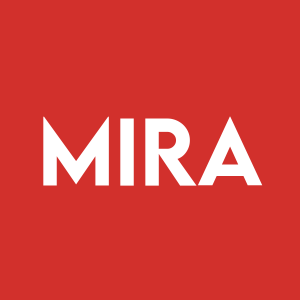MIRA Pharmaceuticals Announces Positive Discovery of Ketamir-2’s Selective NMDA Binding Mechanism of Action
Rhea-AI Summary
MIRA Pharmaceuticals (NASDAQ:MIRA) has announced positive preclinical data for its novel oral ketamine analog, Ketamir-2, bringing it closer to a potential IND submission this year. The latest findings reveal that Ketamir-2 is a selective inhibitor of the NMDA receptor, specifically interacting at the PCP-binding site with 30-50-fold lower affinity compared to ketamine. This selectivity may lead to reduced side effects and an improved safety profile.
Toxicology studies in rats and dogs have shown no toxicity at high doses, indicating an excellent safety margin. Ketamir-2 also demonstrates pronounced antidepressant and anxiolytic activities at lower doses. The compound's unique selectivity and robust safety data enhance its potential as a transformative treatment for neurological and neuropsychiatric disorders, including depression, treatment-resistant depression, and PTSD.
Positive
- Ketamir-2 shows selective inhibition of NMDA receptor, potentially reducing side effects
- Toxicology studies reveal no toxicity at high doses, indicating excellent safety margin
- Ketamir-2 demonstrates antidepressant and anxiolytic activities at low doses
- The compound shows superior brain penetration and bioavailability
- Positive preclinical data brings MIRA closer to potential IND submission this year
Negative
- None.
News Market Reaction – MIRA
On the day this news was published, MIRA gained 28.81%, reflecting a significant positive market reaction.
Data tracked by StockTitan Argus on the day of publication.
Latest positive preclinical data provides another step in the path to potential IND submission this year for novel ketamine analog
MIAMI, FL / ACCESSWIRE / July 25, 2024 / MIRA Pharmaceuticals, Inc. (NASDAQ:MIRA) ("MIRA" or the "Company"), a leading pre-clinical-stage pharmaceutical company, today announced new insights garnered from additional, recently received preclinical study data regarding the mechanism of action and toxicology data for its novel oral ketamine analog, Ketamir-2.
Ketamir-2 is MIRA's drug candidate being investigated as a potential treatment for neurological and neuropsychiatric disorders. The new preclinical study results announced today are the latest in a string of positive research developments which are progressing MIRA's goal of submitting an Investigational New Drug Application (NDA) to the U.S. Food and Drug Administration (FDA) for Ketamir-2 later this year.
Mechanism of Action: Selective NMDA Inhibition
The latest preclinical data reveals that Ketamir-2 is a selective inhibitor of the NMDA receptor of glutamate, the primary excitatory neurotransmitter in the human brain, specifically interacting at the PCP-binding site of the NMDA complex. Ketamir-2 has a 30-50-fold lower affinity to the PCP site compared with ketamine. The lower affinity is important because at high affinity, compounds may affect neurobehavioral functions, potentially leading to side effects such as dissociation and hallucinations. Unlike traditional ketamine, which also affects several other sites on the NMDA receptor and interacts with opioid receptors, dopamine and serotonin transporters, and various acetylcholine receptors, Ketamir-2 exhibits unique selectivity and does not interact with these additional receptor sites. This selectivity is notable as it may contribute to a distinct pharmacological profile for Ketamir-2, potentially reducing the risk of side effects associated with these other interactions.
The potential benefits of Ketamir-2's selective binding also include:
1. Reduced Side Effects: By targeting only the NMDA receptor at the PCP-binding site, Ketamir-2 appears to avoid the broader spectrum of ketamine interactions with other receptors and transporters. This specificity may help minimize unwanted side effects, such as dissociation, hallucinations, and addictive potential, often observed with ketamine use.
2. Improved Safety Profile: The selective inhibition allows for a cleaner pharmacological profile, potentially leading to better tolerability and fewer adverse reactions in patients. These advantages could enhance patient compliance and overall treatment outcomes.
3. Enhanced Therapeutic Effectiveness: With a selective mechanism of action, Ketamir-2 could potentially deliver more consistent and predictable therapeutic effects, which may be particularly beneficial in treating conditions like depression, treatment-resistant depression (TRD), and post-traumatic stress disorder (PTSD).
Enhanced Safety Profile
Complementing its novel mechanism, recently conducted toxicology studies in rats and dogs have shown no toxicity at very high doses of Ketamir-2. These findings underscore Ketamir-2's excellent safety margin, further supported by its pronounced antidepressant and anxiolytic activities observed at oral doses five to tenfold lower than those tested in the toxicology studies. The substantial therapeutic window of Ketamir-2 offers promising potential for safe and effective use in human therapies.
Erez Aminov, Chairman & CEO of MIRA Pharmaceuticals, commented "During the course of this year, working with our research partners, we continue to discover and report on very promising attributes of Ketamir-2 that we hope will, collectively, enable our IND for this compound. These most recent insights into Ketamir-2's mechanism of action and safety profile mark a significant milestone in our preclinical development program. The novel selectivity and robust safety data bolster our confidence in Ketamir-2's potential as a transformative treatment for neurological and neuropsychiatric disorders. We are excited to advance this compound towards clinical trials, aiming to address the unmet needs of patients suffering from conditions such as depression, TRD and PTSD."
Dr. Itzchak Angel, Chief Scientific Advisor of MIRA Pharmaceuticals, added, "The ability of Ketamir-2 to selectively inhibit a single specific site at the NMDA receptor complex without affecting other sites is a remarkable finding. Combined with its strong safety profile and pronounced therapeutic effects, we believe that Ketamir-2 holds great promise as a groundbreaking treatment for mental health disorders. We look forward to continuing our IND enabling studies and our progression towards an IND for Ketamir-2."
Preclinical Progress and Future Plans
The additional data announced today builds on previous findings highlighting Ketamir-2's superior brain penetration and bioavailability. Unlike traditional ketamine, Ketamir-2 is not a substrate for P-glycoprotein (P-gp), a membrane protein that pumps drugs out of cells, including those in the brain. This characteristic may allow Ketamir-2 to penetrate the blood-brain barrier more effectively, enhancing its therapeutic potential.
If MIRA's IND is granted by the FDA, it would pave the way for human clinical trials, bringing Ketamir-2 one step closer to becoming a new standard of care for neurological and neuropsychiatric disorders.
About MIRA Pharmaceuticals
MIRA Pharmaceuticals, Inc. (NASDAQ: MIRA) is a pre-clinical-stage pharmaceutical development company with two neuroscience programs targeting a broad range of neurologic and neuropsychiatric disorders. MIRA holds the exclusive U.S., Canadian and Mexican rights for Ketamir-2, a novel, patent pending oral ketamine analog under investigation to potentially deliver ultra-rapid antidepressant effects, providing hope for individuals battling treatment-resistant depression, major depressive disorder with suicidal ideation and post-traumatic stress disorder. The U.S. Drug Enforcement Administration's scientific review of Ketamir-2 concluded that it would not be considered a controlled substance or listed chemical under the Controlled Substances Act and its governing regulations.
In addition, MIRA's novel oral pharmaceutical marijuana analog, MIRA-55, is currently under investigation for treating adult patients suffering from neuropathic pain as well as anxiety and cognitive decline, often associated with early-stage dementia. MIRA-55, if approved by the FDA, could mark a significant advancement in addressing various neuropsychiatric, inflammatory, and neurologic diseases and disorders. The U.S. Drug Enforcement Administration's scientific review of MIRA-55 concluded that it would not be considered a controlled substance or listed chemical under the Controlled Substances Act and its governing regulations. Additional information about the Company is available at: www.mirapharmaceuticals.com
Ketamir-2 and MIRA-55 are in early-stage preclinical development. There is no assurance that the products will proceed through development or will receive FDA approval for marketing.
Cautionary Note Regarding Forward-Looking Statements
This press release and the statements of the Company's management related thereto contains "forward-looking statements," which are statements other than historical facts made pursuant to the safe harbor provisions of Section 27A of the Securities Act of 1933, as amended, and Section 21E of the Securities Exchange Act of 1934, as amended. These statements may be identified by words such as "aims," "anticipates," "believes," "could," "estimates," "expects," "forecasts," "goal," "intends," "may," "plans," "possible," "potential," "seeks," "will," and variations of these words or similar expressions that are intended to identify forward-looking statements. Any statements in this press release that are not historical facts may be deemed forward-looking. These forward-looking statements include, without limitation, statements regarding the anticipated benefits of the study results described herein as well as the timing for the Company's other preclinical studies and the filing of an IND for Ketamir-2. Any forward-looking statements in this press release are based on the Company's current expectations, estimates and projections only as of the date of this release and are subject to a number of risks and uncertainties (many of which are beyond the Company's control) that could cause actual results to differ materially and adversely from those set forth in or implied by such forward-looking statements. These and other risks concerning the Company's programs and operations are described in additional detail in Annual Report on Form 10-K for the year ended December 31, 2023 and other SEC filings, which are on file with the SEC at www.sec.gov and the Company's website at https://www.mirapharmaceuticals.com/investors/sec-filings. The Company explicitly disclaims any obligation to update any forward-looking statements except to the extent required by law.
Contact Information
Erez Aminov
Chairman & Chief Executive Officer
info@mirapharma.com
(786) 432-9792
SOURCE: MIRA Pharmaceuticals, Inc.
View the original press release on accesswire.com






